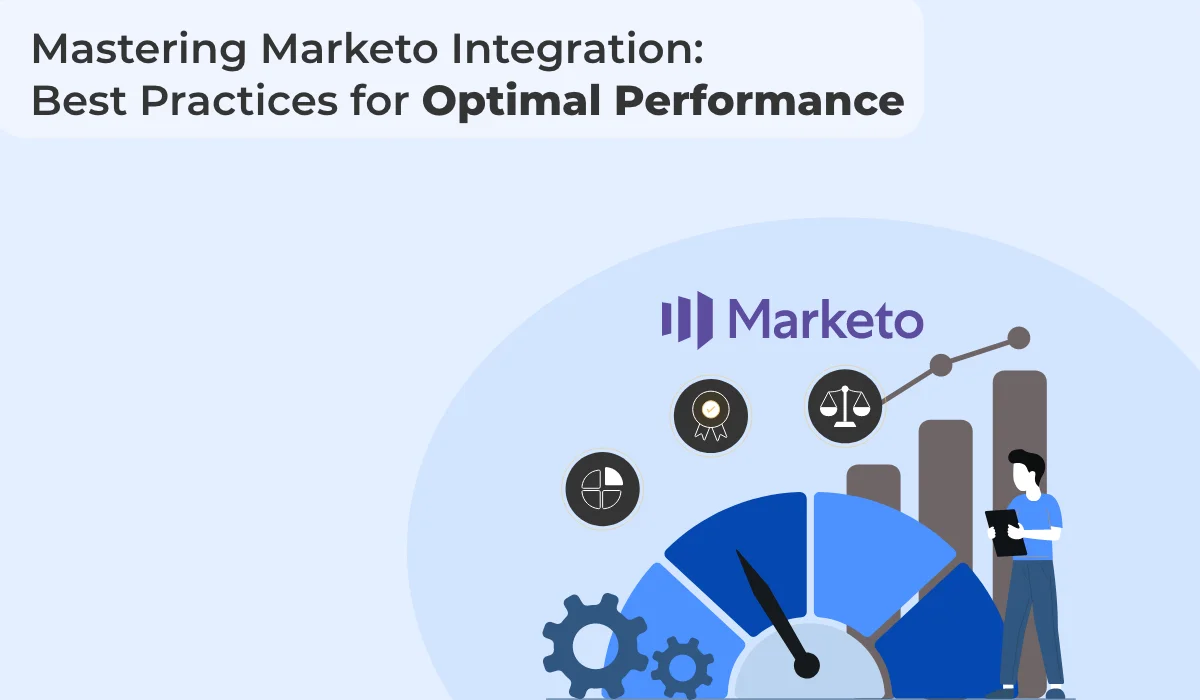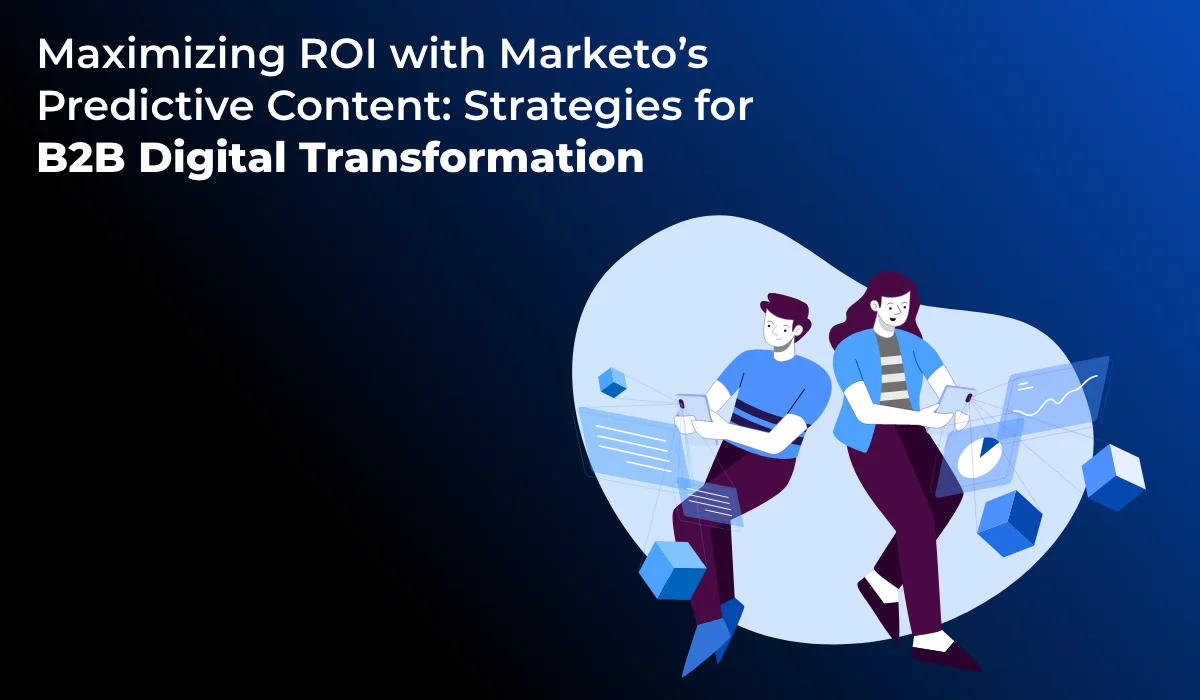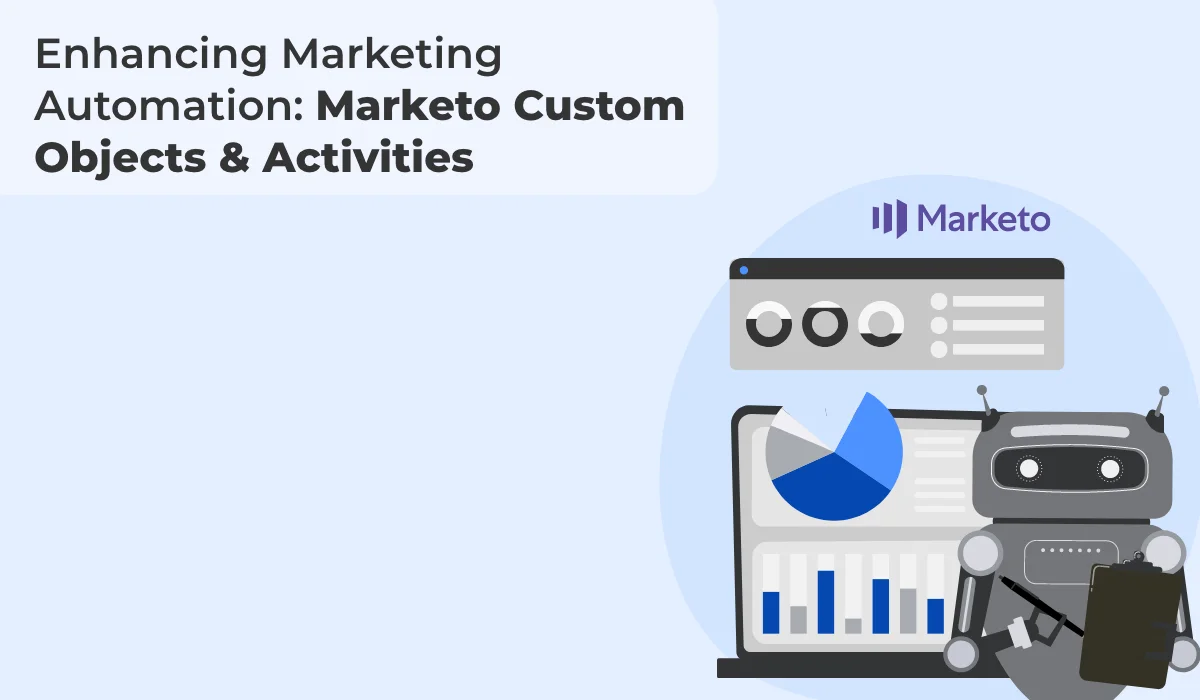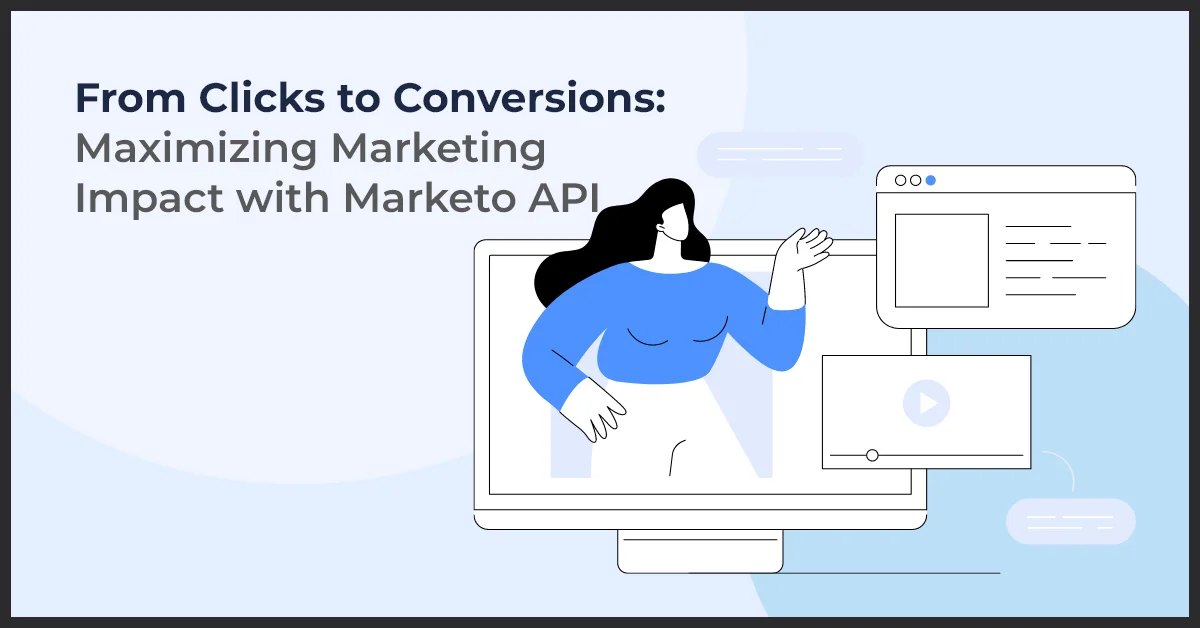Mastering Marketo Integration: Best Practices for Optimal Performance

Published on: June 9, 2023
Updated on: September 27, 2024
1426 Views
- Marketo
22 min read
Imagine trying to navigate through a labyrinth without a map. That's how marketers feel when they can't connect their marketing efforts seamlessly. With a clear route to success, Marketo integration comes to the rescue. Businesses can improve their marketing operations, automate tedious procedures, and acquire insightful data about their target audience by connecting Marketo with other platforms and systems.
Thanks to Marketo integration, it's like having a personal assistant familiar with your consumers' tastes and routines. It makes it possible to deliver tailored experiences, successfully nurture leads, and maximize client engagement throughout their journey. It is the secret to opening the door to more conversions and marketing success.
Marketo guides your marketing activities. Consider it your marketing maestro, organizing campaigns, bringing in prospects, and giving you priceless information. It provides several tools that automate repetitive operations like maintaining campaigns or sending emails, giving you more time to concentrate on the tactical elements of your marketing initiatives.
With Marketo, you have a magic wand to build individualized, data-driven marketing campaigns. Your marketing strategy can advance if you monitor the effectiveness of your initiatives, evaluate the outcomes, and make data-supported decisions.
We will investigate the latent potential of Marketo integration and its lesser-known advantages. So, let's get started!
The Hidden Potential of Marketo Integration
Uncovering Lesser-Known Benefits of Marketo Integration for B2B Organizations
Enhanced Lead Management
Thanks to Marketo integration, B2B firms can streamline their lead management procedures. It enables easy data synchronization between Marketo and other systems, guaranteeing that lead information is consistent and up-to-date. This results in improved lead qualifying, effective lead nurturing, and increased conversion rates.
Personalization at Scale
By integrating Marketo with other platforms, personalization is made powerful. B2B companies can design marketing programs that are incredibly focused and customized by combining client data from several sources. Delivering individualized experiences that connect with your audience is made possible with Marketo integration, which includes dynamic content and personalized email messages.
Holistic Customer Insights
Marketo can be integrated with systems like CRM or customer data platforms to provide a complete picture of your customers. B2B businesses can access detailed information on client interactions, preferences, and habits. These insights help firms optimize their marketing strategy for optimum effect and support data-driven decision-making.
Exploring the Untapped Possibilities of Integrating Marketo with Various Platforms
CRM Integration
Marketo and Customer Relationship Management (CRM) platforms like Salesforce work in perfect harmony. The integration ensures an integrated picture of your customers and enables easy data interchange between Marketo and the CRM. B2B companies can use this connection to promote effective lead management, improve sales alignment, and monitor marketing ROI.
Event Management Integration
Event marketing opportunities greatly expand when Marketo integrates with event management systems like Eventbrite. Businesses can automate event registration, send targeted emails responding to attendees' actions, and collect useful event data to support post-event nurturing programs.
Content Management Integration
Integrating Marketo with content management systems like WordPress or Drupal can help your content marketing strategy reach its full potential. Through this interface, the material can be distributed easily, leads can be automatically collected through forms, and content experiences can be tailored based on user behaviors.
Social Media Integration
B2B companies can scale their social marketing initiatives by integrating Marketo with social media sites like LinkedIn or Facebook. Organizations can efficiently nurture leads and increase engagement on social channels by synchronizing lead data and automating social media marketing.
Comparison of Platform Integrations
| Platform | Features | Pros | Cons |
|---|---|---|---|
| CRM Integration |
|
|
|
| Event Management Integration |
|
|
|
| Content Management Integration |
|
|
|
| Social Media Integration |
|
|
|
Popular Marketo Integration Options
Marketo Integration with Salesforce
Businesses now have many options thanks to the connection between Marketo and Salesforce, the top customer relationship management (CRM) software. Organizations can create a seamless connection between Marketo and Salesforce via Salesforce integration API calls, allowing the synchronization of vital data, including leads, contacts, and opportunities.
This interface enables effective lead management, precise campaign monitoring, and a comprehensive understanding of customer interactions. Marketers can automate lead nurturing, score prospects efficiently, and provide tailored experiences based on thorough customer insights with real-time data communication between Marketo and Salesforce.
Marketo Integration with Qualtrics
By integrating Marketo with the potent experience management platform Qualtrics, companies can gather insightful customer feedback, evaluate survey results, and launch focused marketing campaigns. This connectivity allows businesses to design tailored surveys and collect information that aids in understanding client preferences, quantifying customer happiness, and pinpointing areas for development.
The interface also enables companies to automate activities depending on survey replies, such as sending customized follow-up emails or starting certain marketing campaigns. Businesses can improve their customer segmentation, provide personalized experiences, and fuel effective marketing campaigns by fusing the data-driven capabilities of Marketo with the rich feedback gained through Qualtrics.
Marketo Integration with Zoom
Virtual meetings, webinars, and online events are important in the digital age. With Marketo's connection with Zoom, a top platform for video conferencing and webinars, companies can easily organize virtual events and collect crucial participant data. Organizations can automate event registration procedures, start tailored messaging, and monitor participant participation by connecting Marketo with Zoom.
With the help of this connection, marketers can track event performance, measure lead nurturing effectiveness, and increase conversions. Businesses can create compelling virtual experiences, forge enduring connections with their audience members, and succeed in event marketing when Marketo and Zoom collaborate.
Marketo Integration with Typeform
Marketo can be effortlessly linked with Typeform, a well-liked online form generator, to effectively collect and manage client data. Businesses can gather important data from potential clients or consumers and automate lead generation procedures by embedding Marketo forms into Typeform surveys or quizzes.
This connection enables marketers to nurture leads efficiently and start custom workflows in response to form submissions by ensuring that data collected through Typeform is seamlessly sent to Marketo. The connection simplifies lead generation activities, improves data quality, and allows marketers to provide their target market with individualized experiences.
Overview of Other Integration Partners (ON24, LinkedIn, Cvent, etc.)
Marketo offers a wide range of integration possibilities with additional platforms, including the ones mentioned above, to help you improve your marketing efforts. By integrating Marketo with ON24, a top virtual event and webinar platform, businesses can provide immersive digital experiences, collect participant data, and automate post-event follow-ups.
Businesses can fully utilize LinkedIn's professional networking platform by integrating Marketo, offering insightful data for lead development and nurturing. From registration to post-event interaction, integrating Marketo with Cvent simplifies event management procedures, improving the entire event experience for attendees.
| Platform | Features and Benefits | Pros | Cons |
| Marketo Integration with Salesforce | Seamless synchronization of vital data between Marketo and Salesforce | Effective lead management | Initial setup and configuration required |
| Precise campaign monitoring | Comprehensive understanding of customer interactions | Potential data synchronization issues | |
| Real-time data communication between Marketo and Salesforce | Automation of lead nurturing and scoring | ||
| Tailored experiences based on thorough customer insights | Enhanced marketing campaigns | ||
| Marketo Integration with Qualtrics | Gathering insightful customer feedback and evaluating survey results | Designing tailored surveys and collecting customer preferences | Integration can require technical expertise |
| Launching focused marketing campaigns based on survey insights | Quantifying customer happiness and identifying areas for development | Possible limitations based on the capabilities of Qualtrics | |
| Automation of activities based on survey replies | Improved customer segmentation and personalized experiences | ||
| Marketo Integration with Zoom | Easy organization of virtual meetings, webinars, and online events | Automated event registration procedures | Integration can require technical expertise |
| Collection of crucial participant data | Tailored messaging and participant participation monitoring | Possible limitations based on the capabilities of Zoom | |
| Tracking event performance and measuring lead nurturing effectiveness | Increased conversions | ||
| Marketo Integration with Typeform | Effortless collection and management of client data | Seamless integration of Marketo forms into Typeform surveys or quizzes | Potential compatibility issues between Marketo and Typeform |
| Automation of lead generation procedures based on Typeform submissions | Simplified lead generation activities and improved data quality | Initial setup and configuration required | |
| Ability to provide personalized experiences to the target market | |||
| Overview of Other Integration Partners | Immersive digital experiences, participant data collection, and post-event follow-ups with ON24 integration | Utilizing LinkedIn's professional networking platform for lead development and nurturing | Specific limitations and considerations can vary for each integration partner. |
| Insightful data for lead development and nurturing with LinkedIn integration | Simplified event management procedures and improved attendee experience with Cvent integration |
Advanced Marketo Integration Possibilities
Marketo Integration with AEM (Adobe Experience Manager) and AEP (Adobe Experience Platform)
Integrating Marketo with Adobe Experience Manager (AEM) and Adobe Experience Platform (AEP) produces a seamless end-to-end marketing environment. By combining the strength of Marketo's marketing automation features with AEM's content management system, this connection enables organizations to provide consistent and tailored experiences across a variety of channels.
Marketo's connection with AEP gives marketers access to unified client profiles, which allows them to design targeted campaigns using extensive customer data. This connection allows organizations to provide unified and compelling experiences to their target audience while optimizing content development and campaign management.
Features
- Seamless content and campaign synchronization between Marketo and AEM.
- Access to a unified view of customer data from AEP within Marketo.
- Personalized content delivery across multiple channels.
- Streamlined campaign management and content creation processes.
Benefits
- Consistent and personalized customer experiences across channels.
- Enhanced efficiency in content creation and campaign management.
- Targeted campaigns based on comprehensive customer data.
- Streamlined collaboration between marketing and content teams.
Leveraging Data-Driven Marketing with Google Ads and Google Analytics Integration
By integrating Marketo with Google Ads and Google Analytics, businesses can take advantage of data-driven marketing and obtain insightful statistics on the effectiveness of their campaigns. Marketers can use expanded customer data by easily integrating Marketo with Google Ads to improve ad targeting, attract quality visitors, and increase ROI.
Thanks to the connection with Google Analytics, businesses can analyze and evaluate the success of their marketing initiatives, keep track of website traffic, and gather insightful information about their target audiences. By integrating the capabilities of Marketo, Google Ads, and Google Analytics, organizations can make data-informed choices, optimize marketing expenditures, and provide their audience with more relevant and individualized experiences.
Features
- Integration of Marketo's enriched customer data with Google Ads for optimized ad targeting.
- Tracking and measurement of campaign performance through Google Analytics.
- Access to valuable audience insights and website traffic data.
- Enhanced visibility into the ROI of marketing campaigns.
Benefits
- Improved ad targeting and higher-quality traffic to drive conversions.
- Data-driven decision-making for marketing optimization.
- Better understanding of audience behavior and preferences.
- Enhanced return on marketing investment through data-driven optimization.
Enhancing Project Management with Marketo Integration with Asana
Businesses can improve collaboration, increase productivity, and optimize marketing operations by integrating Marketo with the well-known project management tool Asana. By linking Marketo and Asana, marketers can easily move campaign tasks, due dates, and project information across the two platforms.
Thanks to this connection, teams can coordinate their efforts, monitor project progress, and guarantee that marketing campaigns are carried out on schedule. Marketers can streamline project management and encourage effective cooperation by creating tasks, assigning responsibilities, and monitoring project timeframes straight from inside Marketo.
Features
- Seamless transfer of campaign tasks, deadlines, and project details between Marketo and Asana.
- Simplified task creation and assignment directly from within Marketo.
- Real-time updates and progress tracking on marketing projects.
- Enhanced collaboration and teamwork among marketing teams.
Benefits
- Streamlined project management and improved efficiency.
- Clear visibility into project timelines and task assignments.
- Improved collaboration and communication among team members.
- Timely execution of marketing initiatives and campaigns.
Scalability and Efficiency through Marketo Integration with AWS (Amazon Web Services)
Thanks to Marketo integration with Amazon Web Services (AWS), businesses can grow their marketing operations, improve data processing capabilities, and guarantee safe and dependable data storage.
Organizations can use the scalability and flexibility of AWS infrastructure to manage enormous amounts of data, offer personalized marketing experiences, and improve campaign effectiveness by connecting Marketo with AWS. With the help of this integration, it is possible to handle intricate marketing automation workflows, deal with large amounts of data, and uphold data security and compliance.
Features
- Scalable infrastructure and data processing capabilities provided by AWS.
- Secure and reliable data storage and management.
- Seamless integration of Marketo with AWS services for optimized performance.
- Enhanced data processing and automation capabilities.
Benefits
- Scalability to handle large volumes of data and high-volume transactions.
- Reliable data storage and backup for enhanced data security.
- Efficient data processing and automation workflows.
- Improved performance and reliability of Marketo campaigns.
Visualizing Marketing Performance with Power BI Integration
By integrating Marketo with Power BI, a Microsoft business analytics product, marketers are given greater insight into the effectiveness of their marketing efforts. Due to this connectivity, companies can view and examine Marketo data in real time.
Marketers can then use this information to develop interactive dashboards and reports offering insightful data on campaigns' success, lead generation, and customer interaction. Marketers can monitor important indicators, spot patterns, and make data-driven choices to improve marketing strategies and spur company growth by utilizing Power BI's data visualization features.
Features
- Real-time visualization and analysis of Marketo data using Power BI.
- Creation of interactive dashboards and reports for key marketing metrics.
- Customized data visualizations and insights specific to marketing campaigns.
- Integration with Marketo for seamless data synchronization.
Benefits
- Deeper insights into marketing performance and campaign effectiveness.
- Improved visibility into key metrics and trends.
- Data-driven decision-making for marketing optimization.
- Enhanced reporting and communication of marketing results.
Pro Tip: While Marketo offers many integration options, not all may suit your organization. Assess your specific marketing requirements and objectives before selecting integration partners. Focus on platforms that align with your strategies, enhance efficiency, and drive measurable results. Quality over quantity ensures optimal resource utilization and maximizes the benefits of Marketo integration.
Overcoming Challenges and Success Stories
Addressing Common Challenges in Marketo-Salesforce Integration
Data Synchronization
It might be difficult to guarantee correct and timely data synchronization between Marketo and Salesforce. A precise data management plan, mapping guidelines, and periodic data quality checks are essential to preserve consistency.
Lead Management
Marketo and Salesforce lead management procedures must be coordinated carefully. Organizations should set precise lead qualifying criteria, create uniform lead lifecycle phases, and adopt lead scoring procedures to enable a smooth flow of leads across the two platforms.
Customization and Configuration
Numerous customization possibilities are available in Marketo and Salesforce, which might result in intricate connection configurations. To prevent compatibility problems, it is crucial to specify integration criteria, consult technical specialists, and develop a disciplined configuration procedure.
Campaign Tracking and Attribution
Accurately tracking and attributing campaign effectiveness might be difficult when connecting Marketo with Salesforce. Building precise campaign monitoring systems, defining attribution models, and using unique identifiers are critical to effectively connecting marketing activities with revenue creation.
Success Stories And Real-Life Examples Of Effective Marketo Integration
Cisco
Cisco improved the synchronization of marketing and sales by integrating Marketo with its CRM system. By syncing data across Marketo and Salesforce, Cisco boosted productivity, enhanced lead management, and decreased manual procedures. Thanks to the connection, Cisco managed customer contacts, nurtured prospects, and provided sales teams with improved visibility into marketing operations, which raised conversion rates and increased revenue.
Airbnb
Airbnb included Marketo in its email marketing and website systems. Due to this interface, when customers indicated an interest in renting a home, Airbnb was able to collect leads directly into Marketo. Airbnb used Marketo's automated tools to send customized emails to nurture leads, provide relevant recommendations, and promote conversions. Thanks to the connection, Airbnb's lead generation and email marketing operations were streamlined, which raised engagement.
Marketo's Own Integration with Microsoft Dynamics
Marketo itself offers a demonstration of successful Microsoft Dynamics CRM connectivity. Thanks to the integration between Marketo and Dynamics, Marketo's marketing team now has easy access to lead information, campaign history, and customer data. Through this connectivity, Marketo was able to make the most of the capabilities of its marketing automation platform while preserving a consistent customer view throughout the company. It enabled efficient lead nurturing, tailored messaging, and cooperation between sales and marketing teams, which raised customer engagement and enhanced revenue.
Adobe
Global software giant Adobe streamlined its marketing operations by integrating Marketo with its CRM and social media platforms. By combining Marketo with Salesforce and LinkedIn, Adobe obtained a consolidated view of customer interactions, enhanced lead scoring, and tailored communication. Thanks to the connectivity, Adobe was able to develop targeted social media campaigns, gather leads from social media, and sync the information with Marketo for additional nurturing and conversion. It led to higher lead-to-customer conversion rates, marketing effectiveness, and ROI.
Resolving Integration Issues and Optimizing Integration Workflows
Identify and Address Data Discrepancies
During the integration process, data discrepancies might occur, resulting in inconsistencies between Marketo and other linked systems. Data should be regularly monitored and reconciled to spot and correct any inconsistencies. It might entail precisely mapping data fields, confirming data sources, and implementing data cleansing mechanisms.
Implement Robust Error Handling Mechanisms
Integration workflows can be difficult for several reasons, including network problems or system outages. To successfully collect and manage mistakes, it is imperative to design reliable error-handling methods. It can entail implementing retry systems, setting up error alerts, and logging problem information for debugging.
Monitor Integration Performance and Scalability
As your company expands, ensure the Marketo integration can manage rising data quantities and expanding marketing demands. Regularly monitor integration performance indicators, including system response time, API use, and data transfer rate. Enhance infrastructure and integration processes to enable scalability and effective data processing.
Leverage Automation and Workflow Optimization
Marketo offers strong automation options that help speed up integration processes and increase effectiveness. To automate procedures and reduce manual involvement, use features like data synchronization rules, triggered actions, and campaign flow phases. It decreases the possibility of mistakes while also increasing overall workflow productivity.
Continuous Testing and Validation
Validate and test integration procedures often to ensure their accuracy and effectiveness. Setting up test environments, carrying out integration testing with dummy data, and verifying data integrity across linked platforms can all be necessary for this. A thorough testing and validation procedure should be implemented to help find and fix any integration problems before they impact live operations.
Pro Tip: Ensuring consistent and accurate data between Marketo and Salesforce is paramount for successful integration. To maintain data integrity, implement rigorous data quality checks, establish clear mapping guidelines, and conduct regular audits. By prioritizing data quality assurance from the outset, you can mitigate synchronization challenges and optimize the effectiveness of your Marketo-Salesforce integration
Best Practices for Marketo Integration
Ensuring Data Integrity and Security in Marketo Integrations
Implement Robust Data Validation Processes
Create thorough data validation policies and procedures to guarantee data integrity and correctness throughout the integration process. It entails regularly cleaning the data, confirming data formats, and removing duplicates. You can preserve the accuracy of your client data and stop erroneous or inconsistent data from entering Marketo by establishing strong validation mechanisms.
Secure Data Transmission
When connecting Marketo with other systems, the confidentiality of sensitive customer information is essential. For data transmission between Marketo and integrated systems, use secure protocols like HTTPS. It minimizes the possibility of unwanted access or data breaches by ensuring that data is encrypted while in transit.
Role-Based Access Control
Implementing role-based access control will allow you to manage who has access to your Marketo connection settings. By giving users the proper rights based on their jobs and responsibilities, you can ensure that only authorized staff can see and alter integration setups. It helps guard against unauthorized modifications and misuse of important integration settings and data.
Regular Data Backups
Create a regular backup procedure for Marketo's integrated data. Back up your data frequently to protect yourself against system failures or loss. In case of unanticipated problems, this guarantees you have a duplicate of your data that can be restored.
Tips for Optimizing Marketo Integration for Lead Generation and Nurturing
Define Clear Objectives and KPIs
To gauge the effectiveness of your integration efforts, clearly define your lead generation and nurturing objectives and create key performance indicators (KPIs). By matching your integration approach with your marketing objectives, you can ensure that the integration supports your overall marketing objectives and yields quantifiable outcomes.
Align Lead Scoring and Nurturing
Ensure your integrated systems and lead scoring and nurturing techniques are in sync. Map the lead scoring criteria to appropriately represent lead behavior and engagement data from the connected platforms. Design nurturing programs that similarly use integrated data to provide your leads with individualized and pertinent information. This alignment increases lead qualification accuracy, making real-time data-driven nurturing possible.
Leverage Segmentation and Personalization
Utilize the combined data to divide your audience into different groups based on engagement, activity, and demographics. Create highly targeted and individualized marketing and communications using this segmentation. By offering customized content to particular groups, you can improve engagement and conversion rates and get better results from your lead generation and nurturing efforts.
Continuously Monitor and Optimize
and Analyze the effectiveness of your lead generation and integration activities regularly. Monitor pertinent data, including lead conversion rates, campaign engagement, and pipeline contribution, to learn more about how well your integration is working. Determine opportunities for improvement in light of these revelations. Continuous evaluation and improvement guarantee that your integration meets your changing marketing requirements and yields the best outcomes.
Pro Tip: Consistently monitor integration performance, data quality, and security measures to identify areas for improvement. Regularly assess key metrics and KPIs to ensure alignment with lead generation and nurturing objectives. By maintaining a proactive approach to monitoring and optimization, you can maximize the effectiveness of your Marketo integration and adapt to evolving marketing needs efficiently.
The Future of Marketo Integration: Emerging Trends and Innovations
Predicting the Future of Marketo Integration in the Ever-Evolving Marketing Landscape
Enhanced Personalization
The integration of Marketo will make it possible to personalize content even more effectively. By integrating with customer data platforms (CDPs), businesses can obtain and combine data from numerous sources, enabling highly targeted and personalized marketing campaigns across many channels.
AI and Machine Learning Integration
Marketo integration will use AI and machine learning (ML) technology to generate more intelligent and automated marketing operations. Thanks to AI-powered Predictive analytics, marketers can forecast consumer behavior, automate lead nurturing, and improve campaign success.
Emerging Channels in Integration
Marketo will continue to develop its ability to integrate with new platforms and channels, such as voice assistants, augmented reality (AR), virtual reality (VR), and other cutting-edge channels that offer distinctive consumer experiences.
Emerging Trends and Technologies That Will Shape the Future of Marketo Integration
Integration with Marketing Automation Ecosystem
Marketo integration will become more integrated with other marketing automation platforms and solutions to create a complete ecosystem that streamlines marketing operations. Integration with CRM platforms, social media management platforms, content management systems, and advertising platforms will make campaign orchestration possible.
Integration of Customer Data Platforms (CDPs)
Thanks to Marketo integration with CDPs, businesses can organize and activate consumer data from various sources, enabling more individualized marketing experiences. CDP integration will benefit distributed personalized content, customer journey mapping, and audience segmentation.
Integration with Advanced Analytics and Reporting Tools
Marketo's integration with cutting-edge analytics and reporting solutions will give marketers greater insights into campaign success, consumer habits, and revenue attribution. Marketers can make data-driven choices and optimize marketing strategies by integrating tools like data visualization platforms, attribution modeling services, and marketing analytics dashboards.
Automation of Cross-Channel Campaigns
Marketo integration will make the automation of cross-channel marketing campaigns easier. Marketers can design complex multi-channel campaigns incorporating SMS, mobile applications, social media, email, and more. The outcome will be a seamless consumer experience with consistent and individualized messages across touchpoints.
Integration with IoT Devices
The Marketo integration will include IoT devices to collect real-time data on client interactions and behavior data as the Internet of Things (IoT) grows. By integrating with IoT devices, marketers can customize content and experiences based on information gathered from linked devices, opening up new engagement opportunities.
Key Takeaways
- Marketo integration facilitates efficient lead management, personalized marketing campaigns, and holistic customer understanding, improving marketing performance and increasing conversions.
- Each integration serves specific purposes, from improving lead management and event marketing to enhancing content distribution and social media engagement, providing marketers with versatile tools to amplify their strategies.
- Real-life examples from companies like Cisco, Airbnb, and Adobe demonstrate the tangible benefits of Marketo integration, including improved synchronization between marketing and sales, streamlined lead generation and nurturing, enhanced customer engagement, and increased revenue.
- Marketers need to address integration challenges, ensure data integrity and security, define clear objectives and KPIs, align lead scoring and nurturing, and embrace future trends such as enhanced personalization, AI and machine learning integration, integration with emerging channels, and IoT devices.
Conclusion
Marketo integration offers immense potential for maximizing marketing effectiveness and driving business growth. By uncovering the hidden benefits, exploring integration options, resolving challenges, and adopting best practices, organizations can unlock the true power of Marketo.
To stay ahead in the ever-evolving marketing landscape, embracing emerging trends and innovations in Marketo integration is crucial. Businesses can deliver highly personalized and impactful marketing campaigns by integrating with new channels, leveraging AI and machine learning, and harnessing the power of data. We encourage you to explore innovative integration approaches and embrace Marketo integration's possibilities.
To learn more about how Marketo integration can transform your marketing efforts, contact us at info@growthnatives.com or +1 855-693-4769. Don't miss the opportunity to elevate your marketing strategies with Marketo integration.
Frequently Asked Questions
Marketo integration involves connecting Marketo, a marketing automation platform, with other systems, such as customer relationship management (CRM) platforms like Salesforce.
Marketo is integrated with Salesforce through a bidirectional synchronization process, ensuring that marketing and sales teams can access consistent and up-to-date data. This integration allows for seamless transfer of leads, contacts, opportunities, and other relevant information between the platforms.
Integration between Marketo and Salesforce streamlines marketing and sales processes, enhances lead management, improves campaign tracking, and enables better alignment between marketing and sales teams, ultimately leading to increased efficiency and revenue.
Marketo is considered one of the best marketing automation platforms due to its comprehensive feature set, user-friendly interface, robust lead management capabilities, advanced analytics, and scalability to meet the needs of businesses of all sizes.
Salesforce due to its native integration, seamless data synchronization, and alignment with Salesforce’s ecosystem.
API integration in Marketo allows seamless communication between Marketo and other systems by enabling data exchange and triggering actions based on specific events or conditions.
The bulk API limit for Marketo refers to the maximum number of records that can be processed in a single API call, which is typically set at 1000 records per call.
The concurrent API limit for Marketo defines the maximum number of simultaneous API requests that can be made at any given time. This limit varies based on the Marketo subscription plan but is typically restricted to a certain number of concurrent requests to ensure system performance and stability.



